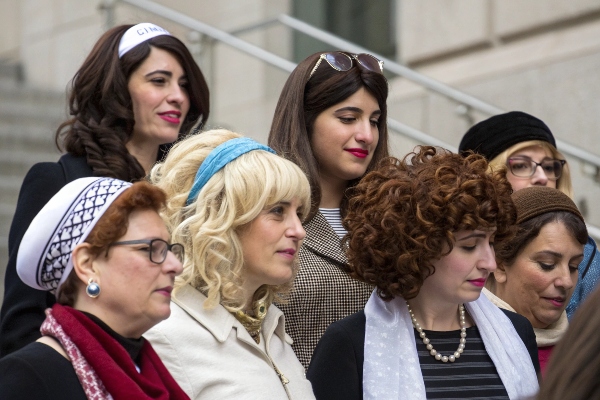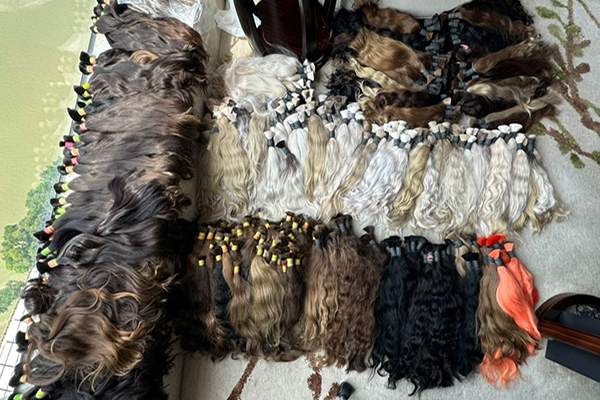Jewish Wigs Are Only for Jewish Women?
The allure of Jewish wigs extends beyond their traditional roots, embracing a wider audience beyond Jewish women. Though initially for Jewish women, their evolution into a luxury commodity has captured the interest of many.
Jewish wigs have evolved from serving Jewish women to becoming luxury items appreciated by diverse fashion enthusiasts across the globe.
Initially crafted for specific cultural purposes, Jewish wigs now signify opulence and style, attracting individuals who value their sophisticated appeal. They’ve transcended their original cultural confines, gaining attention far beyond the Jewish community as icons of high fashion.
Jewish Wigs Are Only for Married Women?
While certain Jewish traditions link wig-wearing to marital status, not all Jewish women follow this rule. This tradition is particularly significant in Orthodox communities.
Traditionally, wigs mark married status in Orthodox Jewish communities, but single women may don wigs for personal expression and style preference too.

Sheitels signify modesty among married Orthodox women, but other women wear them for reasons beyond tradition. The practice varies, allowing wig-wearing to reflect personal choices or stylistic preferences, showcasing the breadth of diversity in adherence among Jewish women.
All Wigs Meet Religious Requirements?
The notion that all wigs adhere to Jewish law is misleading, as adherence specifics vary among communities, influencing wig characteristics.
While some communities maintain strict wig guidelines, not all wigs meet Jewish religious requirements due to variations in customs.
Understanding Kashrut guidelines around wigs is crucial, as requirements can vastly differ. Materials and production methods are scrutinized to ensure they align with Jewish values, revealing nuances in wig appropriateness according to community-specific standards and traditions.
Wigs Suppress Women’s Beauty?
While wigs are seen by some as suppressing beauty, many Jewish women view them as expressions of cultural identity and personal faith.
Critics argue wigs conceal beauty, but many Jewish women proudly use them to express faith and cultural identity, embracing them as symbols of empowerment.
Wigs serve as pivotal elements of identity for women within many faith contexts. Their choice in styles, colors, and lengths becomes an extension of beauty and individuality, reflecting personal tastes while preserving cultural ties. Women’s empowerment often flourishes through these stylistic expressions, rejecting notions of concealment.
Wigs Are Worn to Hide?
The assumption that wigs are solely for hiding beauty misses their function as fashion statements and personal choice extensions.
Wigs are often more about fashion and individuality than about concealing beauty, highlighting personal style choices amongst wearers.
Jewish women use wigs not just to adhere to religious customs but to showcase their personal flair. Available in numerous styles, wigs allow creativity in appearance and reinforce charm rather than suppress it. Driven by personal aesthetics, wigs celebrate beauty, individual choice, and identity in vibrant ways.
All Jewish Women Must Wear Wigs?
Jewish women are not universally mandated to wear wigs; adherence is influenced by religious and personal preferences.
Wig-wearing among Jewish women varies, influenced greatly by denomination and personal beliefs.

Orthodox women largely follow sheitel practices, yet many women within Conservative and Reform branches may opt out. A spectrum of beliefs and decisions characterizes wig-wearing, emphasizing personal choice interwoven with culture. This variance in practice highlights individuality among communal traditions.
Wigs Are an Outdated Custom?
Despite historical roots, Jewish wigs remain relevant, with women integrating modern meaning into this ancient custom.
Though traditional, Jewish wigs find significance today, embracing and redefining their cultural importance in contemporary society.
What may seem like an outdated tradition evolves through modern takes on cultural practices. A blend of heritage and innovation brings renewed meaning to wig-wearing among Jewish women. Preserving history while adapting to new generations underscores the dynamic nature of wigs in modern contexts.
Jewish Wigs Are the Best Quality?
Jewish wigs, often associated with superior craftsmanship due to usage of top-grade virgin hair, sometimes suffer from varying quality levels.
Jewish wigs typically employ high-quality virgin hair, though some manufacturers substitute lower standard materials, which impacts overall quality.
Quality standards differ, with many relying on remy or virgin hair while others may cut costs using substandard materials. Research into materials and reputable producers ensures one’s choice in wigs aligns with expectations of excellence, safeguarding value and authenticity.
All Wig Companies Can Produce Jewish Wigs?
Mastery in crafting Jewish wigs involves expertise specific to high-end production capabilities not found in all wig companies.
Only well-skilled companies, particularly in Qingdao, China, craft Jewish wigs, with over 90% production concentrated there.
Production quality requires familiarity with intricate details, seen prominently in companies located in Qingdao City, China, noted for their meticulous approach to wig creation. Specialized techniques and craftsmanship ensure adherence to cultural nuances, presenting limitations to general production capabilities elsewhere.
Quick Turnaround Time for Jewish wigs Orders?
Due to demand, Jewish wig companies often meet custom orders leading to longer timelines, specifically responding to personal customer specifications.
Jewish wigs typically need custom production, taking around 3-4 weeks to complete due to intricate demands and options for buyers.
This dedication to personalization results in extended timelines as orders reflect precise specifications— coloring, length, material tailored to individual choices. Though this practice ensures satisfaction, it requires patience, embodying meticulous craftsmanship associated with bespoke wigs.
Conclusion
Jewish wigs redefine themselves across generational shifts. From traditional foundations to luxurious fashion items, they symbolize culture, personal choices, and beauty. Expertise in their creation, alongside preservation of cultural customs, indicates their enduring significance within and beyond their historical origin.







